3 June 2023 : The Hindu Editorial
The Hindu Editorial
3-June-2023
Daily Current Affairs For UPSC ,The Hindu Editorial Summary
1. A critical juncture in Manipur
Topic: GS2 – Indian polity and governance.
Context:
-
-
-
Ten Kuki-Zo legislators of the Manipur Assembly, including seven from the ruling BJP, have called for a separate administration in Manipur due to perceived tacit support from the government for violence against the Chin-Kuki-Mizo-Zomi hill tribals by the Meitei majority.
-
-
Issue:
Demand for separate administration:
-
-
-
A rally in Thoubal by a Meitei committee expressed the need to protect the territorial integrity of Manipur.
-
The demand for a separate administration enjoys unprecedented popular support among Kuki-Zo groups, marking a critical juncture in their quest for autonomy.
-
Article 3 of the Constitution grants unilateral power to the central government to change a state’s borders, making it necessary to navigate constitutional processes.
-
Three possible institutional architectures are proposed: granting a separate administration to the hill areas for Kuki-Zo and Nagas, a separate administration for Kuki-Zo in dominant districts, or maintaining the status quo with the territorial integrity of Manipur intact.
-
-
Changes in constitutional arrangements and other implications:
-
-
-
Maintaining the status quo may require dissolving existing sub-State constitutional arrangements, potentially leading to a deeply divided society.
-
Genuine recognition and accommodation of territorially mobilized groups are crucial for holding together a federal polity like Manipur, drawing lessons from other countries that have faced similar challenges.
-
The debates on protecting the territorial integrity of Manipur are likely to continue without immediate resolution, highlighting the tension between the rights of states and the rights of territorially mobilized minority groups.
-
The question remains whether the interests and agendas of various actors across India’s federal polity align to protect the majority’s power or promote the rights of minority groups within and across states.
-
-
2. International trade has a carbon problem
Topic: GS3 – International trade/globalisation.
Context:
-
-
-
India is concerned about the European Union’s Carbon Border Adjustment Mechanism (CBAM), fearing it will harm India’s export of carbon-intensive products to the EU.
-
-
Issue:
CBAM and India’s concerns:
-
-
-
The CBAM is seen as protectionist and discriminatory by India, and there is talk of challenging it at the World Trade Organization (WTO).
-
The EU implemented the Emissions Trading System (ETS) in 2005 to reduce greenhouse gas emissions, but imports from countries with less stringent policies may not be priced in a similar way, putting EU industries at a disadvantage.
-
The CBAM aims to address this by levelling the playing field and making imports of carbon-intensive products bear the same economic costs as EU producers under the ETS.
-
The application of the CBAM may raise concerns about non-discrimination under WTO law, as it may discriminate between goods based on inadequate carbon pricing policies or onerous reporting requirements.
-
The question of whether carbon-intensive products are ‘like’ and whether processes and production methods should be considered in comparing products is debated in international trade law.
-
The CBAM may violate WTO law by discriminating between EU and foreign products based on embedded emissions.
-
Justifying the CBAM under the General Exceptions clause of the GATT may be possible, but it is doubtful if it would satisfy the requirement of not resulting in arbitrary or unjustifiable discrimination.
-
The CBAM is an important issue in the India-EU free trade agreement negotiations, and India should work with the EU to secure gains and ensure smooth onboarding for Indian exporters while considering the possibility of a WTO challenge.
-
-
3. The current revenue trajectory presents an opportunity to fix GST’s flaws
Topic: GS3 – Indian economy.
Context:
-
-
-
Gross Goods and Services Tax (GST) revenues grew by 11.5% to surpass ₹1.57 lakh crore in May.
-
-
Issue:
-
-
-
This is the slowest growth in six months and 16% lower than April’s collections, which were boosted by financial year-end compliances.
-
However, May’s collections indicate a positive trend, with GST revenues crossing the ₹1.5 lakh crore mark for the sixth time, and averaging over ₹1.53 lakh crore between October 2022 and May 2023.
-
Despite retail inflation cooling and wholesale prices slipping into deflation, revenues have held up.
-
Initial data suggests an acceleration in economic activity, with manufacturers experiencing their best month since October 2020 and fuel sales and wholesale auto sales rebounding.
-
The Revenue Department is undertaking a two-month drive to tackle evasion and fake registrations, and e-invoicing will be mandatory from August for firms with a turnover over ₹5 crore.
-
The government should seize this opportunity to address policy-level anomalies in the GST, such as setting up tribunals, clarifying gaming and casino levies, and streamlining the rate structure.
-
-
4. India needs to harness the benefits of AI while avoiding adverse effects
Topic: GS3 – Science and technology.
Issue:
-
-
-
Generative artificial intelligence (AI) can create new data and is commonly used to generate text, images, and code in response to user requests.
-
OpenAI’s ChatGPT chatbot is a well-known example of generative AI.
-
AI models backed by neural networks and trained on large datasets have been used for various purposes, including finding new antibiotics and alloys.
-
However, there are concerns about the misuse of AI, especially its ability to falsify data.
-
Some AI pioneers have expressed alarm about the risks of AI and its potential impact on society, comparing it to risks such as pandemics and nuclear war.
-
Specific concerns include the lack of transparency in AI models, the use of copyrighted data, protection of human dignity and privacy, and safeguards against falsifying information.
-
Current AI models do not necessarily address these concerns, and there is a need for policies to regulate potentially dangerous applications of AI.
-
The Indian government should take proactive measures, such as maintaining an open-source AI risk profile, creating sandboxed environments for testing high-risk AI models, promoting explainable AI, defining intervention scenarios, and monitoring AI development.
-
Inaction could lead to adverse consequences and hinder India’s ability to harness AI for positive purposes.
-
-
For Enquiry
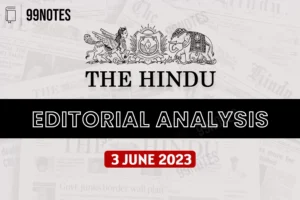
3 June 2023 : The Hindu Editorial
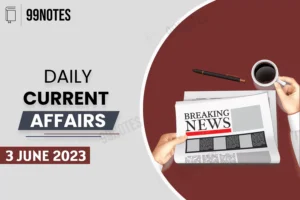
3 June 2023 : Daily Current Affairs
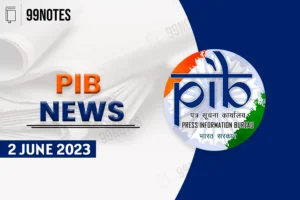
2 June 2023 : PIB
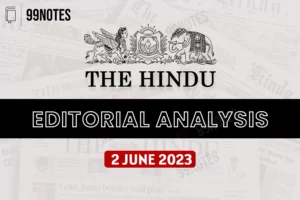
2 June 2023 : The Hindu Editorial

2 Jun2 2023 : Daily Current Affairs
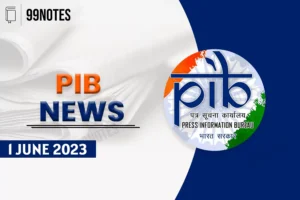
1 June 2023 : PIB
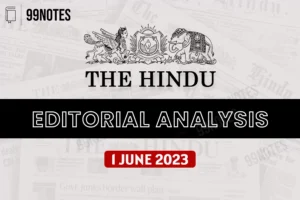
1 June 2023 : The Hindu Editorial

1 June 2023 : Daily Current Affairs
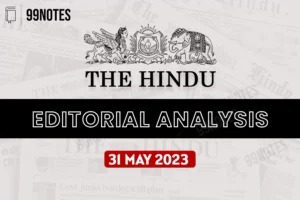
31 May 2023 : The Hindu Editorial
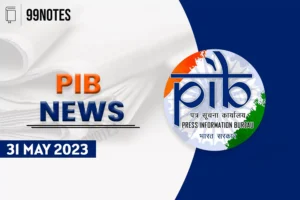
31 May 2023 : PIB
The Hindu 3 June 2023 : The Hindu Editorial The Hindu Editorial
3-June-2023
Daily Current Affairs For UPSC ,The Hindu Editorial Summary
Facebook-f
Twitter
Youtube
1.Marriage…
Daily Current Affairs 3 June 2023 : Daily Current Affairs DAILY CURRENT AFFAIRS
3-June-2023
Daily Current Affairs For UPSC ,Daily Current affairs of The hIndu…
PIB 2 June 2023 : PIB PRESS INFORMATION BUREAU
2-June-2023
Daily Current Affairs For UPSC ,The PIB ( Press Information Bureau…
The Hindu 2 June 2023 : The Hindu Editorial The Hindu Editorial
2-June-2023
Daily Current Affairs For UPSC ,The Hindu Editorial Summary
Facebook-f
Twitter
Youtube…
Daily Current Affairs 2 Jun2 2023 : Daily Current Affairs DAILY CURRENT AFFAIRS
2-June-2023
Daily Current Affairs For UPSC ,Daily Current affairs of The hIndu…
PIB 1 June 2023 : PIB PRESS INFORMATION BUREAU
1-June-2023
Daily Current Affairs For UPSC ,The PIB ( Press Information Bureau…
The Hindu 1 June 2023 : The Hindu Editorial The Hindu Editorial
1-June-2023
Daily Current Affairs For UPSC ,The Hindu Editorial Summary
Facebook-f
Twitter
Youtube…
Daily Current Affairs 1 June 2023 : Daily Current Affairs DAILY CURRENT AFFAIRS
1-June-2023
Daily Current Affairs For UPSC ,Daily Current affairs of The hIndu…
The Hindu 31 May 2023 : The Hindu Editorial The Hindu Editorial
31-May-2023
Daily Current Affairs For UPSC ,The Hindu Editorial Summary
Facebook-f
Twitter
Youtube…
PIB 31 May 2023 : PIB PRESS INFORMATION BUREAU
31-May-2023
Daily Current Affairs For UPSC ,The PIB ( Press Information Bureau…


